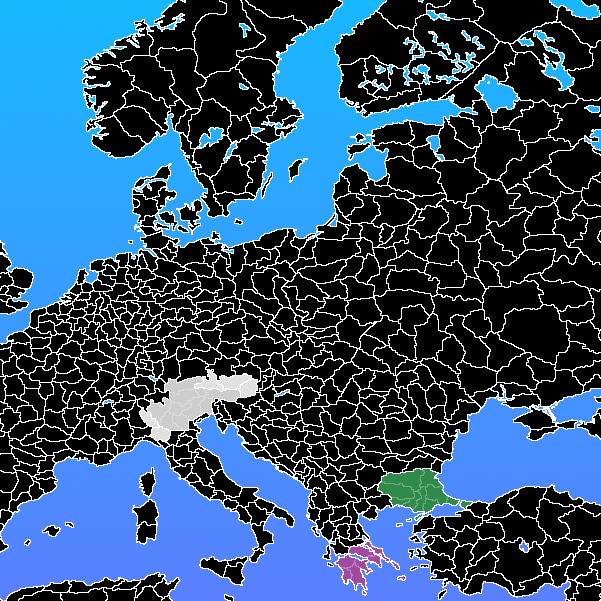A statue stands in Milleniumm Square in Lilongwe, one hand lowered, holding a water pitcher from which clean, filtered water emerges. The other holds up an orb that is the only source of illumination in the large square in the evening twilight. The statue gazes upward at the orb, its expression meant to be one of confidence and grandeur, but in practice, looking rather blank.
Yesterday there was a gathering here, a celebration even. For there was much to celebrate. Last wet season* had yielded a surplus harvest, and the MDP's millitary was in the process of securing key deepwater ports in Mozambique. The water pitcher itself was both practical, and intended to emphasize a key accomplishment: the clean water it produced came from a wastewater treatment plant built within the city.
But the celebrations had been cut short. The sudden and as yet unexplained death of Jonathan Mavuto, a key ally of the Project, a tribal chief and a member of the elected lower house (General Assembly) had cut the festivities short.
The project's leaders had long understood that if Africa were to industrialize, it would be done by the local people, and not by Western hands, and Mavuto's work had helped make that happen, ensuring that many communities could adopt new farming and medical practices while preserving their cherished traditions. His death had also left the question of cause. An autopsy quickly determined that the proximate cause of death was a heart attack. The coroner had left it at that.
The General Assembly was not convinced. Mavuto was a healthy man in his 40s, after all. Further, they considered the rest of the world. Enough global communication infrastructure had survived that both the Assembly, and the Council (the unelected Upper House currently consisting of African Union people that had led the peacekeeper army that formed the project. Its future is uncertain but its power is significant) had heard. Reports of terrorism, assassination and the resurgence of transnational crime came from every semi-stable corner of the globe. The assembly, naturally, was frightened by the thought that someone could be killing them.
Mavuto did not have any implants or pacemakers, so he could not have been hacked, but there are other ways to induce a heart attack. An overdose of the common surgical medication Suxamethonium Chloride would be one example. Whether the assembly was reasonably concerned, or just being paranoid, the council and the Mayor of Lilongwe had decided to organize an investigation for the sake of completion.
Of the four people now present on the scene, three had been tasked with investigating, to satisfy the Assembly. The fourth finished filling her water jug from the statue's clean pitcher-water and left.
At the front of the group was Akachi Aderemi. A Nigerian woman who reported directly to the council. Her skin and hair were white, unusually so**, and a headset obstructed her eyes and most of her face. She wore an African Union uniform. Next to her were two Malawi men, Unika, Mavuto's sharply dressed and ever alert former bodyguard, and Paul, a local police investigator.
But Akachi was not currently focused on this scene. Her headset showed a dark background with 6 other people standing in a circle (they were all communicating with each other via similar headsets): the members of the Council. Head Councilor Mfumu (former president of Malawi) spoke: "The assembly may be paranoid, but it is our duty to investigate this to their satisfaction. If Mavuto was murdered, then all of us may be in danger"
Jack Voorhees, a south african industrialist of Dutch ancestry and the councilor responsible for overseeing the lanthanum mines spoke next. His speech sounded distorted, due to the implant in his trachea that reversed the effects of an old war wound.
"Akachi, your resources are, by necessity, limited. Mozambique must take priority over a likely meaningless murder investigation. Nevertheless, we have some funds retained. Inform the council if you are in need of them. Best of luck, my Sister." ***
he turned towards Mfumu and began to speak: "I hope my shipment has arrived without incident?"
Akachi cut her feed before she could hear the rest of the exchange. There was work to attend to.
She turned towards the others: "Do we have the footage of Mavuto's death?"
Unika: "Yeah, and I've marked the spot where he died, right here."
Paul: "I have the full coroner's report. They didn't find anything unusual, and Mavuto's family has asked for his body to be returned to them. We must respect that request, so if we want to access the body, we better do it tonight"
Akachi: "Hmm.. Alright, lets go look at the body. Give me the flash drive with the footage, I want to take a look at it. The Assembly is probably panicking over nothing, but if foul play was involved, I think we can find it..."
...
*My go-to reference on Malawi seasons
http://www.explore-malawi.com/travel-info/when-to-visit-malawi. As a general rule I force myself to learn about and write cultures and regions that I don't have personal experience with. If I screw something up (e.g. climate, geography, etc.) tell me. The culture of the Projects has shifted a lot from modern Malawi, though if I say anything blatantly incoherent also say so.
**Akachi has albinism. I don't expect this to be significant here, though it would have mattered in her homeland
*** It should be fairly clear that their not related. His use of Sister here may strike an outside observer as odd. The Council is not confused by it, though most of them would not use it that way. Why he chooses that phrase, I will leave unknown for now (and yes, I am making all of these people up as I go along. I have no grand plot here, yet)






